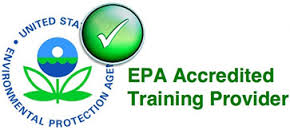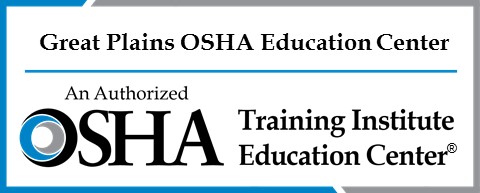Center for Environmental Education and Training
The Saint Louis University Center for Environmental Education and Training (CEET) mission is to provide high-quality occupational environmental, health and safety training that empowers workers to stay safe on the job and positively impact their communities.
Authorized by the Occupational Safety and Health Administration (OSHA) as a Region VII OSHA Training Institute Education Center, we believe everyone deserves a safe and healthy workplace and that workplace safety and social justice are interconnected. The SLU center is committed to delivering training that meets regulatory requirements and strives to create a safety and social responsibility culture by equipping workers with the knowledge, skills and tools to identify and prevent workplace hazards, clean up environmental hazards, protect their rights, and advocate for change.
All courses are appropriately authorized or accredited by state and federal entities so you can be certain you receive quality training that meets compliance criteria. SLU instructors are environmental health and safety professionals with qualifications and certificates suitable for their assignments. They have a wide range of backgrounds, including business, industry, health care, armed forces, regulatory agencies, research, and academics. They bring a wealth of experience to these courses to help you achieve your goals. Continuing education credits (CEUs) are available.
Various entities approve courses to ensure quality training:
- Designated by the U.S. Department of Labor as an OSHA Training Institute Education Center in 2002, Saint Louis University’s Center for Environmental Education and Training has nationally recognized programs.
- Missouri Department of Health and Senior Services and the Illinois Department of Public Health. The only St. Louis regional provider for Occupational Lead Training accredited by both states.
- U.S. Environmental Protection Agency (EPA) accreditation for Lead Renovation, Repair and Painting (RRP) courses.
- Hazardous Waste Operations and Emergency Response (HAZWOPER) training programs recognized by the National Institute of Environmental Health Sciences (NIEHS) through the Partnership for Environmental Training and Education (PETE).
- Missouri Department of Elementary and Secondary Education approved CEET vocational rehabilitation and workforce development training programs.
- Partnership with St. Louis Community College, funded by EPA, to deliver Environmental Remediation Job Training Programs and HAZMAT Technician Training Programs.
Available Training
SLU's Center for Environmental Education and Training (CEET) offers numerous occupational environmental, health and safety courses, ranging from lead abatement and Hazardous Waste Operations and Emergency Response (HAZWOPER) training to OSHA Regulations and Standards.
Seeking alternative dates for OSHA courses? See pdf catalog below for courses offered throughout Iowa, Kansas, Missouri and Nebraska, (DOL Kansas City Region, formerly Region VII):
For lead abatement worker, lead abatement supervisor, lead inspector, lead risk assessor and lead renovation, repair and painting (RRP) course schedules, see below:
To receive updates about the upcoming EPA Brownfields Job Training Programs, please contact us at rene.dulle@slu.edu.
Occupational, safety and health training sessions can be scheduled and designed to meet your specific needs, including a location of your choice. For more information, contact Dephanie McGill-Brandon, program manager, at 314-977-8256 or dephanie.mcgillbrandon@slu.edu.
The OSHA Outreach Trainer Authorization Program authorizes those who complete the training program to teach 10-Hour and 30-Hour Hazard Awareness Courses for General Industry or Construction.
You must meet the prerequisites for experience and training. OSHA does not issue waivers for either the experience or training prerequisites. The prerequisites are as follows:
- Training. Complete 'OSHA 510 Occupational Safety and Health Standards for the Construction Industry' or complete 'OSHA 511 Occupational Safety and Health Standards for General Industry.' This course covers OSHA policies, procedures, standards, construction safety, and health principles. Ideal training for any safety professional.
- Experience. Have five years of construction safety or general industry safety experience. A college degree in occupational safety and health, a Certified Safety Professional (CSP), or Certified Industrial Hygienist (CIH) designation may be substituted for two years of experience.
- Download and submit the 500/501 Prerequisite Verification Form (PDF) for approval.
- Download and submit the 502/503 Prerequisite Verification Form (PDF) for approval.
- Once approved, you must complete 'OSHA 500 Trainer Course in OSHA Standards for Construction' or complete 'OSHA 501, Trainer Course in OSHA Standards for General Industry.' Special emphasis is placed on those topics that are required in the 10- and 30-hour programs and those that are the most hazardous. Course participants are briefed on effective instructional approaches and the effective use of visual aids and handouts. Persons completing this course will receive an "Authorized Construction or General Industry Trainer Card."
Outreach trainers are authorized for four years. Before the expiration of their authorization status, authorized trainers must take 'OSHA 502 Update for Construction Industry' or 'OSHA 503 Update for General Industry Outreach Trainers' course to renew their authorization for another four years. If your Trainer card expires, you will need to retake the OHSA 500 or 501 course to become reauthorized as a trainer. Register for all 500-level courses here.
Professional Certification Programs
Advance your career in safety and health by earning a professional certification offered by the Great Plains OSHA Training Institute Education Center. An industry-recognized credential demonstrates your commitment to continuing professional development in a growing and changing field.
The certification programs are self-paced and can be started and completed anytime. Although there is no time limit for completing the courses, completing the required coursework within seven years is recommended. Transfer up to one required course from any OSHA Training Institute Education Center outside of OSHA Region VII (Great Plains OSHA Education Center).
The SSH professional certification program provides the foundational knowledge needed in safety and health. The program addresses workplace hazards and provides an understanding of OSHA regulatory standards with an emphasis on your industry of choice.
Select from General Industry, Construction Industry, or Health Care Industry certification tracks. The SSH certification program requires four OSHA courses. No experience in safety and health is required to complete.
Course requirements include the OSHA 510 or OSHA 511 Standards Course and three other courses from the list of available electives. The SSH can be applied toward more advanced certifications: Certified Health and Safety Official (CSHO) and Safety Health and Environmental Professional (SHEP).
Download applications below:
The CSHO professional certification program builds on the foundational knowledge of the SSH certification program in the field of safety and health in the construction industry or general industry. The CSHO certification program focuses on safety and health regulations and interpretations, training requirements, employee safety and involvement, workers’ rights and responsibilities, employer accountability, and program development and implementation. This program requires six OSHA courses and two electives. Courses can be applied toward advanced-level certifications (SHEP). Application requirements are subject to change without notice. An applicant's specific requirements are those that are in effect when the Application for Professional Certification is approved.
Download applications below:
The SHEP professional certification program takes your learning to the next level by expanding upon the health and safety knowledge gained through the CSHO program. The SHEP program focuses on environmental compliance, hazardous materials and risk management. These are areas that most health and safety professionals will oversee at some point in their careers. This program requires completing the CSHO certification program plus three OSHA courses. Application requirements are subject to change without notice. An applicant's specific requirements are those that are in effect when the Application for Professional Certification is approved.
This program provides a well-rounded introduction in OSHA standards and safety practices, making this series a great fit for professionals across industries who want to strengthen their knowledge of safety management and compliance.
Who Should Take this Program: Ideal for managers, supervisors, and safety professionals responsible for implementing or improving workplace safety and health programs.
OSHA 7500: Introduction to Safety and Health Management (virtual)
- Description: This course provides an overview of effective safety and health management systems, focusing on ways to identify, prevent and control workplace hazards. Participants will learn about core program elements, such as management commitment, employee involvement, worksite analysis, and hazard prevention and control.
OSHA 7510: Introduction to OSHA for Small Businesses (Optional)
- Description: Specifically designed for small business owners and managers, this course introduces OSHA’s requirements and guidelines tailored to smaller organizations. Topics include recognizing hazards, managing risks, and understanding small business-specific regulations to foster a safer workplace. Ideal for entrepreneurs and small organizations looking to better understand OSHA regulations and compliance needs.
OSHA 7515: Job Hazard Analysis (virtual)
- Description: This course introduces participants to the process of job hazard analysis (JHA), which helps identify potential hazards associated with specific job tasks and develop control measures to reduce risk. Attendees will learn how to break down tasks, identify hazards, and implement safety improvements. Relevant for anyone responsible for evaluating and minimizing risks within specific job functions.
OSHA 7505: Introduction to Incident (Accident) Investigation (virtual)
- Description: This course covers the basics of conducting effective incident investigations to prevent future occurrences. Participants will learn investigative techniques, root cause analysis, and the importance of documenting incidents. Practical exercises help attendees understand how to apply these skills in real-world scenarios. Relevant for anyone who is involved in incident investigations or who wants to strengthen workplace safety practices.
OSHA 7845: Recordkeeping Rule Seminar (virtual)
- Description: This seminar provides guidance on OSHA’s recordkeeping requirements for reporting and recording workplace injuries and illnesses. Attendees will learn which incidents must be documented and reported, as well as how to complete OSHA forms. Relevant for anyone who is responsible for maintaining and submitting OSHA-required records, or anyone involved in workplace injury and illness reporting.
OSHA's Safety and Health Fundamentals Certificate program supports OSHA's mission by training public and private sector employees in occupational safety and health to reduce incident rates for workers. Participants can earn certificates for construction, maritime and general industry training, choosing from topics such as occupational safety and health standards, safety and health management, incident investigation, fall hazard awareness, and recordkeeping.
All courses required to complete the certificate program are available through Great Plains OSHA Education Center or other OTI Education Centers. To earn a certificate, students must complete a minimum of 68 (construction and general industry) or 77 (maritime) contact hours.
After Great Plains OSHA Education Center confirms you meet the requirements, OSHA directly awards the Safety and Health Fundamentals (SHF) Program certificate. No plaque is awarded for OSHA’s SHF certificate program.
More Information
Refund Policy
A full refund will be given if a student withdraws from a course five full days before the first day of the class meeting. No refunds will be given for withdrawals four business days before the first class meeting or after the class has begun. Requests for withdrawals must be submitted in writing to the Center for Environmental Education and Training (CEET) Program office by email at SLUCEET@slu.edu. Refunds will be based on the date the request is received via email.
Attendance Policy
Students are required to attend all class sessions to receive a certificate of completion. If an absence cannot be avoided, students should notify a minimum of 24 hours in advance of absence via email to SLUCEET@slu.edu or call 314-977-8256 and inform CEET program office staff.
Class Cancellation Policy
Any changes in course dates, times, or locations will be emailed to students using the email address provided during enrollment. The University reserves the right to cancel with 3-5 days’ notice if sufficient enrollment is not achieved. Full refunds will be issued for classes canceled by the University. Classes rescheduled due to unforeseen circumstances, such as inclement weather, will not be refunded. Please email SLUCEET@slu.edu or call 314-977-8256 with any questions.

